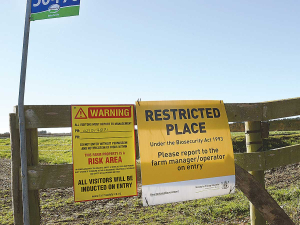Biosecurity progress and challenges for NZ winegrowers
Dr Ed Massey is General Manager Sustainability at New Zealand Winegrowers.
 With the transition of the Mycoplasma bovis programme to a National Pest Management Plan, the number of biosecurity levies farmers pay will increase to seven.
With the transition of the Mycoplasma bovis programme to a National Pest Management Plan, the number of biosecurity levies farmers pay will increase to seven.
In its submission on proposed amendments to the Biosecurity Act, DairyNZ says its levy-paying members invested more than $60 million across the biosecurity system last year, through multiple biosecurity levies across several entities and legislative frameworks to collect this funding.
It points out that this adds unnecessary complexity, administrative cost and a lack of transparency with levy investment in biosecurity for farmers.
"We would like to see a more integrated and sustainably funded biosecurity system for the livestock sector that minimises risks through collective readiness and good biosecurity practices," it says.
"To support this, our farmers need certainty and consistency of the principles that will be applied to risk management, cost-sharing, and decision-making across the biosecurity system."
It also notes that delivery of services within the biosecurity system is fragmented, with inconsistent legislative and system settings to support effective funding and delivery.
"Different programmes often have the same stakeholders involved and this contributes to the frustration experienced by dairy farmers about regulatory burden and lack of transparency of levy investment."
DairyNZ notes that farmers currently fund the biosecurity system through six different levies and with the transition of the Mycoplasma bovis programme to a National Pest Management Plan (NPMP), this increases to seven.
"Dairy farmers may also contribute further funding to the biosecurity system when cattle are designated as beef cattle for slaughter and on the purchase of seed for arable crops."
It recommends that biosecurity levies consolidated into a single levy (or fewer levies) with the creation of a cross-industry organisation that integrates the deliver, and funding, of biosecurity services would be a more efficient way to recover costs and lessen administrative expense for industry and government.
Horticulture New Zealand (HortNZ) says a new report projects strong export growth for New Zealand's horticulture sector highlights the industry's increasing contribution to the national economy.
Fonterra shareholders say they will be keeping an eye on their co-operative's performance after the sale of its consumer businesses.
T&G Global says its 2025 New Zealand apple season has delivered higher returns for growers, reflecting strong global consumer demand and pricing across its Envy and Jazz apple brands.
New Zealand's primary sector is set to reach a record $62 billion in food and fibre exports next year.
A new levying body, currently with the working title of NZWool, has been proposed to secure the future of New Zealand's strong wool sector.
The most talked about, economically transformational pieces of legislation in a generation have finally begun their journey into the statute books.